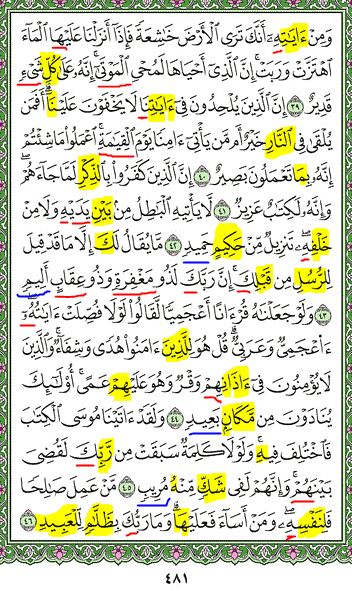
السلام عليكم ورحمة الله وبركاته,
Welcome to the end, that is, the end of our Arabic grammar series based on al-Ajurroomiyyah (but don’t worry, I’ve got of plenty of other stuff planned out to write on). We’ve looked at all the situations that a noun can be in raf’ or nasb. Today, we’ll look at when it can be in jarr and we’ll get it all done in one final segment إن شاء الله.
By the way, the word جَرّ means “to drag something”, which makes sense because kasrah is written using a dragging stroke below the letter.
And away we go…
الْمَخْفُوْضَاتُ ثَلاثَةُ أنْوَاعٍ: مَخْفُوْضٌ بِالْحَرْفِ، وَمَخْفُوْضٌ بِالإضافَةِ، وَتابِعٌ لِلْمَخْفُوْضِ
The khafdh-ized words are three: khafdh-ized using particles, khafdh-ized using idhafah and a follower of a khafdh-ized word
They are three kinds of jarr-ized words (the Ajurroomiyyah uses khafdh instead of jarr, but they are the same thing). Each will be explained in detail further below:
- In jarr because one of the حُرُوف الجَرِّ (particles of jarr) is before it. They are mentioned here, along with some more that are mentioned in this chapter. In أشْفَقْتُ عَلَى خَالِدٍ (“I longed for Khalid”), the word خالِدٍ is in jarr because the word before it, عَلى, is one of the particles of jarr
- In jarr because of the idhafah of another word to it. This is when a second noun is associated with the first. In جاءَ غُلامُ مُحَمَّدٍ (“The boy-servant of Muhammad came”), the word مُحَمَّدٍ is in jarr because it’s mudhaaf ilayh (i.e. another noun was added to it)
- In jarr because it is a grammatical follower of another word that is in jarr
- It could be a نَعْت (description) like in أخَذْتُ الْعِلْمَ عَنْ مُحَمَّدٍ الْفَاضِلِ (“I took knowledge from Muhammad, the honorable”). مُحَمَّدٍ is in jarr because of عَنْ before it, and الفاضِلِ is in jarr because it describes مُحَمَّدٍ
- It could be an عَطْف (conjunction) like in مَرَرْتُ بِمُحَمَّدٍ وَخالِدٍ (“I passed by Muhammad and Khalid”). مُحَمَّدٍ is in jarr because of بِ before it and خالِدٍ is in jarr because وَ connects it to مُحَمَّدٍ
- Or it could be one of other two kinds of followers, التَوْكِيْد (The emphasis) and الْبَدَل (The substitute)
Also remember that even though kasrah is the main indicator of jarr, sometimes the letter ي or fathah can substitute for it.
Using a particle of jarr
فَأَمَّا المَخْفُوْضُ بِالْحَرْفِ فَهُوَ: ما يُخْفَضُ بِمِنْ، وَإلى، وَعَنْ، وَعَلَى، وَفِيْ، وَرُبَّ، وَالْباءِ، وَالْكافِ، وَاللامِ، وَبِحُرُوْفِ القَسْمِ، وَهِيَ: الْوَاوُ، وَالْباءُ، وَالتَّاءُ، أَوْ بِوَاوِ رُبَّ، وَبِمُذْ، وَمُنْذُ
As for the word that is khafdh-ized using particles, it is whatever’s khafdh-ized using مِنْ (min), وَإلى (ilaa), عَنْ (‘an), عَلَى (‘alaa), فِيْ (fee), رُبَّ (rubba), the letter ب, the letter ك, the letter ل, one of the particles used for oaths (they are the letter و, the letter ب, the letter ت), the و of رُبَّ, or either of مُذْ (mudh) or مُنْذُ (mundhu)
The first kind of jarr-ized word is when one of the particles of jarr is before it. There are many of them, and below are some of them with selected meanings (they are used with both outright nouns and pronouns unless stated otherwise):
- مِنْ – Starting or beginning, for example: وَمِنْكَ وَمِنْ نُوْحٍ (“and from you and from Noah”) [33:7]
- إلَى – Ending, for example إلَيْهِ يُرَدُّ عِلْمُ السَّاعَةِ (“To Him is knowledge of the Hour attributed”) [41:47] and إلى اللهِ مَرجِعُكُمْ جَمِيْعاً (“To Allah is your return all together”) [5:48]
- عَنْ – Going past/beyond or surpassing something, as in لَقَدْ رَضِيَ اللهُ عَنِ الْمُؤْمِنِيْنَ (“Allah was certainly pleased with the believers”) [48:18] and رَضِيَ اللهُ عَنْهُمْ وَرَضُوْا عَنْهُ (“Allah is pleased with them and they with Him”) [98:8]
- عَلَى – Rising or going up, as in وَعَلَيْهَا وَعَلى الْفُلْكِ تُحْمَلُوْنَ (“And upon them and on ships you are carried”) [23:22]
- فِيْ – Frame of time or place, as in وَفِيْ السَّماءِ رِزْقُكُمْ (“And in the heaven is your provision”) [51:22] and لا فِيْها غَوْلٌ (“No bad effect is there in it”) [37:47]
- رُبَّ – Reducing or lessening and it’s only used for indefinite outright nouns and not pronouns, as in رُبَّ رَجُلٍ كَرِيْمٍ لَقِيْتُهُ (“Few a noble man have I met”)
- بِ – Making an intransitive verb transitive, as in فَإمَّا نَذْهَبَنَّ بِكَ (“And whether We take you away”) [43:41] and ذَهَبَ اللهُ بِنُوْرِهِمْ (“Allah took away their light”) [2:17]
- كَ – Resemblance, and is only used for outright nouns, as in مَثَلُ نُوْرِهِ كَمِشْكَاةٍ (“The example of His light is like a niche”) [24:35]
- لِ – Deservingness and ownership, as in سَبَّحَ لِلهِ ما فِيْ السَّماواتِ وَالْأرَضِ (“Whatever is in the heavens and earth exhalts Allah”) [57:1] and لَهُ مُلْكُ السَّماواتِ وَالْأرْضِ (“For His is dominion of the heavens and the earth”) [57:5]
- The three particles used for oaths (ب – ت – و), and we’ve already done those here
- The و of رُبَّ, as in a line by the poet Imru’l-Qays: وَلَيْلٍ كَمَوْجِ الْبَحْرِ أرْخَى سُدُوْلَهُ عَلَيَّ (“And many a night, like the waves of the sea, has dropped its veils over me”) – The و here has the same meaning as رُبَّ
- مُذْ and مُنْذُ – They act on time periods, with the meanings of:
- مِنْ (“from/since”) if the word after it is in the past, as in ما رَأِيْتُهُ مُذْ يَيْمِ الْخَمِيْسِ (“I haven’t seen him since Thursday”) and ما تكَلَّمْتُهُ مُنْذُ شَهْرٍ (“I haven’t spoken to him for a month”)
- فِيْ (“in”) if the word after it is in the present, as in لا أُكَلِّمُهُ مُذْ يَوْمِنا (“I did not talk to him today”) and لا ألْقاهُ مُْنْذُ يَوْمِنا (“I did not meet him today”)
- If a verb follows one of these two, or the word after them is a noun in raf’, then they are nouns, not particles of jarr
Using إضافَة (idhafah)
وَأمَّا مَا يُخْفَضُ بِالإضَافَةِ، فَنَحْوُ قَوْلِكَ: غُلاَمُ زَيْدٍ وَهُوَ عَلَى قِسْمَيْنِ: مَا يُقَدَّرُ بِالامِ، وَما يُقَدَّرُ بِمِنْ؛ فَالَّذِي يُقدَّرُ بِاللامِ نَحْوُ غُلاَمُ زَيدٍ وَالَّذِيْ يُقَدَّرُ بِمِنْ، نَحْوُ ثَوْبُ خَزٍّ وَبَابُ سَاجٍ وخَاتَمُ حَدِيدٍ، وَما أشْبَهَ ذَلِكَ
As for the word that’s khafdh-ized using idhafah, it’s like your saying غُلاَمُ زَيْدٍ (“The servant-boy of Zayd”) and it is two kinds: what implies the meaning of لِ (“for”) and what implies the meaning of مِنْ (“from”). What implies لِ is like غُلاَمُ زَيْدٍ and what implies مِنْ is like ثَوْبُ خَزٍّ (“a garment of silk”), بابُ ساجٍ (“a door of oak”), خاتَمَ حَدِيْدٍ (“a ring of iron”) and whatever resembles that
A word that is in jarr because of idhafah is actually three kinds (the Ajurroomiyyah mentioned only two):
- The idhafah implies the meaning of مِنْ (“from”), and this is when the mudhaaf is part of the mudhaaf ilayh, as in جُبَّةُ صُوْفٍ (“a cloak of wool”). The cloak is part of wool and made from a piece of it
- It implies the meaning of فِيْ (“in”), and this is when the mudhaaf ilayh is a ظَرْف (frame of time or place) for the mudhaaf, as in بَلْ مَكْرُ اللَيْلِ (“Rather, [your] conspiracy of night”) [34:33]. The night is the frame of time for the conspiracy and is when the conspiracy happens. Note: This one was not mentioned in the text, and we are adding it for completeness
- It implies the meaning of لِ (“for”), and this is for whatever doesn’t fall in the other two, like ownership, as in غُلامُ زَيْدٍ (“the boy-servant of Zayd”) or exclusivity, as in حَصِيْر الْمَسْجِدِ (“the mat for the masjid”)
If you’ve forgotten what an idhafah is, you can reference it here.
The grammatical follower
This was dealt with when we looked at grammatical followers of a word that is in raf’. For jarr , the same concept applies, so a follower of a word that’s in jarr will follow it in jarr.
From the Quran
Below is a page from the Quran (41:39-46). Words that have been jarr-ized using a particle are highlighted, mudhaaf ilayh‘s are underlined in red, and followers of jarr-ized words are underlined in blue.

- If لِ comes before a word that starts with ا, like الله or الذي or any definite noun with ال at the beginning, the ا is dropped. So you’ll see لِلرُّسُلِ and لِلَّذِيْنَ instead of لِالرُّسُلِ and لِالَّذِيْنَ
- All the followers on this page are adjectives of the word right before them, except word مُرِيْبٍ (“disquieting”), which describes the word شَكٍّ (“doubt”). Note: A grammatical follower does not have to come immediately after the word whose status it’s following
- It bears repeating that pronouns like هُ and هُمْ are fixed and do not change their sound between states. If you see them take a kasrah like هِ and هِمْ, it’s for pronunciation purposes only
- مِنْ بَينِ يَدَيْهِ is really four (count ’em) words. Word-for-word, the whole thing is “from between the two hands of it”, but it’s translated as “from in front of it:
- مِنْ (“from”), a particle of jarr followed by,
- بَيْنِ (“between”), which is mudhaaf to,
- يَدَيْ (“two hands”) -The ا in يّدانِ (“two hands”) switched to ي because the word is mudhaaf ilayh, and in turn, it’s going to drop it’s final ن because it in turn is in mudhaaf to,
- the pronoun هِ (“he/it”)
- Note: You can have multiple mudhaaf ilayh‘s chained up, with a mudhaaf ilayh being mudhaaf to the word after it
Questions
- In how many situations will a word be in the state of jarr?
- What are some meanings that these particles indicate, and which of them are not used with pronouns? مِنْ – عَنْ – فِيْ – رُبَّ – كَ – لِ
- How many kinds of إضافَة are there?
- When will it have the meaning of مِنْ (“from”) and when will it have the meaning of فِيْ (“in”)?
Until next time, السلام عليكم
Like this post? Simply enter your e-mail and click “Yes, include me!” for updates
Yes